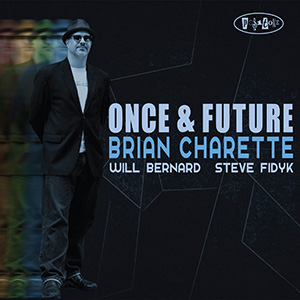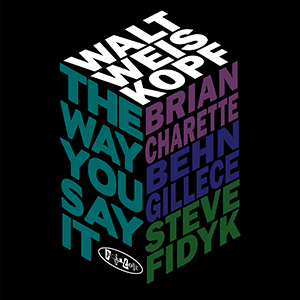http://www.allaboutjazz.com
Some labels release a few records a year; some put out a record every month or two; and then there are those, like the Los Angeles-based Posi-Tone Records, that prefer to push even more music through the pipeline.
As 2014 came into being, Posi-Tone began an ambitious release schedule, putting out a new album every few weeks. Those who cover jazz and follow the scene intently can’t seem to turn around these days without bumping into one of their discs. Everything from groove dates to post-bop parties to beyond-the-norm entries fly under the banner of this small-but-thriving label. Here’s a look at four from the ever-growing Posi-Tone pile.
 Brian Charette
Brian Charette
Square One
Posi-Tone
2014
Organist Brian Charette has appeared as a sideman on several albums for this imprint, but Square One is his leader debut for Posi-Tone. He works with the tried-and-true organ trio format here and it suits him well.
Guitarist Yotam Silberstein and drummer Mark Ferber join Charette for what starts out solid and turns into a hell of a ride. The first few tracks on this one almost almost seem like a warm-up, as the band finds its footing with funk-to-swing fun (“Aaight!”), pays respect to Larry Young(saxophonist Joe Henderson’s “If”), and pleasantly waltzes on by (“Three Martina”). All of this material comes together well, but sparks don’t always fly. That all changes when the band finds its stride with The Meters’ “Ease Back.” That track, which comes at the midpoint of the album, starts the winning streak. Everything that follows is superb. Ferber’s snare drum groove on “A Fantasy” makes the song, Silberstein pulls out some Lionel Loueke-esque sounds on “Things You Don’t Mean,” and the whole band becomes strikingly unhinged during “Ten Bars For Eddie Harris.”
Charette’s ability to hunker down into a groove, look to the outer limits, or switch between the two at a moment’s notice helps to keep listeners on their toes during this delightful and occasionally daring date.
 Jared Gold
Jared Gold
JG3+3
Posi-Tone
2014
Jared Gold, like Charette, has never subscribed to old school organ orthodoxy. He’ll give the past its due, but he works in the present. This is his seventh album in seven years—all released on Posi-Tone—and it finds him fronting an augmented organ trio, with three horns added to the mix. These other voices don’t dominate the program, but they do get to step out on occasion, round out the sound of the group, create some harmonic heft, and add some secondary colors to these pieces.
The album opens on Gold’s slow swinging “Pendulum,” guitarist Dave Stryker’s crackling “Spirits,” and Julian “Cannonball” Adderley’s gospel-inflected “Sermonette,” complete with some baritone saxophone preaching from Jason W. Marshall. The attention then shifts to the core trio during a take on James Taylor’s “Shower The People” that shifts focus from nuanced texture painting to slick-and-slippery funk. Drummer Sylvia Cuenca steals the show on a burning “No Moon At All,” trumpeter Tatum Greenblatt steps up to the plate on “I Just Can’t Stop Loving You,” and alto saxophonist Patrick Cornelius gets to shine on Gold’s lively-and-bouncy “Fantified.” This mostly-covers set finishes with two more, as a smoking “Cubano Chant” and comfortable “Charcoal Blues” finish things off in style.
 Steve Fidyk
Steve Fidyk
Heads Up!
Posi-Tone
2014
Drummer Steve Fidyk is best known for his sideman and studio contributions, writing for Modern Drummer magazine, and work with the Taylor/Fidyk Big Band. Here, he makes his bones with the Posi-Tone gang by fronting a quintet that features a pair of heavy-hitters—trumpeterTerell Stafford and saxophonist Tim Warfield. The program contains four Fidyk originals, two numbers from guitarist Shawn Purcell, and three covers.
Heads Up!, like the aforementioned Charette album, doesn’t start out with the most distinctive music on the disc. It’s the first cover—”Make Someone Happy”—that, strangely enough, gives Fidyk’s music its own identity. A muted Stafford draws focus as Fidyk’s brushes glide along below. From that point on, most everything makes its mark. Purcell’s guitar and Regan Brough’s bass join together for the Charlie Parker-ish “Might This Be-Bop,” which is also bolstered by Fidyk’s brushes, and Stafford picks up his flugelhorn for an uncommonly slow and beautiful take on “I Can See Clearly Now.”
Fidyk’s most notable originals—”The Flip Flopper,” a funky tune with some memorable guitar work from Purcell, and the warm-hearted “T.T.J.”—come later in the album, but it’s Cole Porterthat has the final word; Fidyk and company finish with a metrically-altered “Love For Sale” that’s pure fun.
Tom Tallitsch
Ride
Posi-Tone
2014
Saxophonist Tom Tallitsch focuses on his own music on his second release on Posi-Tone and fifth date as a leader. He throws in David Bowie’s “Life On Mars” and Led Zeppelin’s “Ten Years Gone” for good measure, but the other nine tracks are all of his making.
Tallitsch proves to be a commanding player throughout Ride, but it’s the sidemen that help to bring out the best in the music. Rock solid players like pianist Art Hirahara and bassistPeter Brendler help to keep things running smoothly, guest trombonist Michael Dease brings the heat, and Rudy Royston, the seemingly ubiquitous super drummer, adds some wattage to Tallitsch’s tunes. Royston’s in high spirits on the title track and he drives the hell out of a few other numbers.
While the faster material always carries excitement with it, Talitsch’s strongest pieces aren’t the burners. “Rain,” which Tallitsch accurately frames as “gospel country,” the Brazilian-tinged “El Luchador,” which gives Dease a chance to shine, and the bluesy “Knuckle Dragger” all leave more of a lasting impression on the ear.
Tracks and Personnel
Square One
Tracks: Aaight!; If; Three For Martina; People On Trains; True Love; Ease Back; Time Changes; A Fantasy; Yei Fei; Things You Don’t Mean; Ten Bars For Eddie Harris.
Personnel: Brian Charette: organ; Yotam Silberstein: guitar; Mark Ferber: drums.
JG3+3
Tracks: Pendulum; Spirits; Sermonette; Shower The People; No Moon At All; I Just Can’t Stop Loving You; Fantified; Cubano Chant; Charcoal Blues.
Personnel: Jared Gold: organ; Dave Stryker: guitar; Sylvia Cuenca: drums; Patrick Cornelius: alto saxophone; Jason Marshall: baritone saxophone; Tatum Greenblatt: trumpet.
Heads Up!
Tracks: Untimely; Last Nerve; Make Someone Happy; Might This Be-Bop; I Can See Clearly Now; The Flip Flopper; The Bender; T.T.J.; Love For Sale.
Personnel: Steve Fidyk: drums; Terell Stafford: trumpet, flugelhorn; Tim Warfield: tenor saxophone; Shawn Purcell: guitar; Regan Brough: bass.
Ride
Tracks: Ride; Life On Mars; Rubbernecker; Rain; The Giving Tree; Ten Years Gone; El Luchador; The Myth; Knuckle Dragger; The Path; Turtle.
Personnel: Tom Tallitsch: tenor saxophone; Michael Dease; trombone; Art Hirahara: piano; Peter Brendler: bass; Rudy Royston.
 Brian Charette has rapidly become a rising star on the Hammond B3 organ for the past few years and his latest CD is a salute to his fellow players, ranging from greats of the Swing Era to current players. Well accompanied by guitarist Will Bernard and drummer Steve Fidyk, Charette is interested in modernizing vintage tunes while putting his stamp on them. Starting with Fats Waller’s “Jitterbug Waltz”, Charette swings but the peppy rhythm section gives this jazz favorite a new flavor. His funky take of Larry Young’s blues “Tyrone” downplays John Coltrane’s influence on its composer and turns it into a percolating number for partying. The band engages in shout-outs of the title to Jack McDuff’s engaging funky blues “Hot Barbecue”, though Charette’s keyboard fireworks merit the real attention. Bud Powell’s “Dance of the Infidels” isn’t commonly heard on organ, but this imaginative treatment may open the door for others to conduct further explorations. Charette wraps the session with his hip “Blues For 96”. The future of Hammond B3 is in great hands
Brian Charette has rapidly become a rising star on the Hammond B3 organ for the past few years and his latest CD is a salute to his fellow players, ranging from greats of the Swing Era to current players. Well accompanied by guitarist Will Bernard and drummer Steve Fidyk, Charette is interested in modernizing vintage tunes while putting his stamp on them. Starting with Fats Waller’s “Jitterbug Waltz”, Charette swings but the peppy rhythm section gives this jazz favorite a new flavor. His funky take of Larry Young’s blues “Tyrone” downplays John Coltrane’s influence on its composer and turns it into a percolating number for partying. The band engages in shout-outs of the title to Jack McDuff’s engaging funky blues “Hot Barbecue”, though Charette’s keyboard fireworks merit the real attention. Bud Powell’s “Dance of the Infidels” isn’t commonly heard on organ, but this imaginative treatment may open the door for others to conduct further explorations. Charette wraps the session with his hip “Blues For 96”. The future of Hammond B3 is in great hands Calling Coltrane an influence is an exercise in stating the obvious for most saxophonists under the age of sixty. The undisputed Heavyweight Champion of the horn still exerts a seismic impact so vast as to be nearly indelible. Tenorist Walt Weiskopf is one of the multitude who came under the Coltrane thrall early in his artistic inquiry, but like the best of that number he’s been able to wrestle inspiration into submission in the service of a sound he can accurately call his own. The Way You Say It registers as his sixteenth effort as a leader and it’s the first to feature him with the singular instrumentation of organ, vibraphone and drums.
Calling Coltrane an influence is an exercise in stating the obvious for most saxophonists under the age of sixty. The undisputed Heavyweight Champion of the horn still exerts a seismic impact so vast as to be nearly indelible. Tenorist Walt Weiskopf is one of the multitude who came under the Coltrane thrall early in his artistic inquiry, but like the best of that number he’s been able to wrestle inspiration into submission in the service of a sound he can accurately call his own. The Way You Say It registers as his sixteenth effort as a leader and it’s the first to feature him with the singular instrumentation of organ, vibraphone and drums.


 Brian Charette
Brian Charette Jared Gold
Jared Gold Steve Fidyk
Steve Fidyk